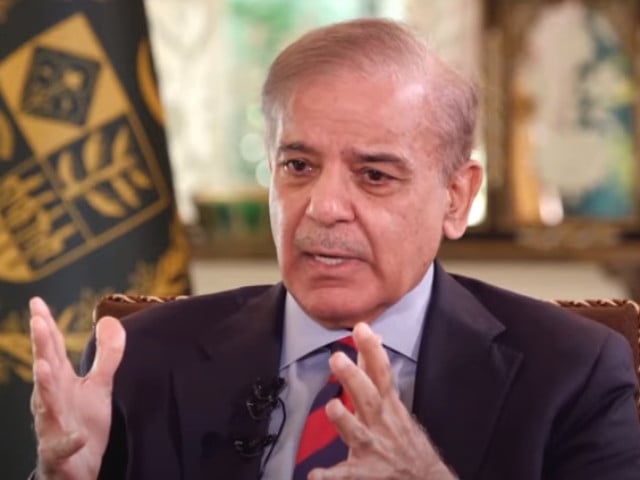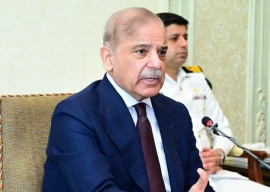
Prime Minister Shahbaz Sharif ordered immediate release of Rs23 billion to resolve the problems facing the people of Azad Jammu and Kashmiri (AJK), envisaging massive subsidies on flour and electricity tariffs in the wake of ongoing protest against inflation in the region.
Shehbaz chaired a special meeting, attended by the AJK leadership and leaders of allies in his coalition government to have a detailed review of the current situation in AJK. He said that the government stood with the Kashmiri people and would not leave them alone.
“The prime minister ordered an immediate release of Rs23 billion to resolve the issues confronting the people of AJK,” the Prime Minister Office said a statement. “The prime minister decided to provide funds after thoroughly examining the situation of the territory,” it added.
Prime Minister Shehbaz summoned the AJK leadership, and key allies in the wake of five days of protest movement in AJK, on the call of the Joint Awami Action Committee (JAAC), which had traders at its forefront in most parts of the territory.
During the meeting, the AJK leadership and all the participants thanked the prime minister for his timely intervention and the release of funds. The Pakistan Peoples Party (PPP) leaders stressed the need for resolving the AJK issues immediately and amicably.
Read AJK protests persist into third consecutive day
The meeting was attended by Finance Minister Muhammad Aurangzeb, Information Minister Atta Tarar, Law Minister Azam Nazir Tarar, besides Aleem Khan, Rana Tanveer, Owais Leghari, Syed Khurshid Shah Amir Maqam, and others.
After the announcement of the financial package by the Centre, the AJK government issued two separate notifications – one by the food department and the other by the electricity supply department – announcing new subsidised rates of flour and electricity tariff.
The food department notifications stated that 40-kg bag of flour would now be sold at Rs1,100 and20-kg bag of fine flour at Rs1,000 at the department’s sale depots and registered dealers, adding that the AJK government’s flour subsidy would now rise to Rs30 billion from the previous Rs15 billion, annually.
The electricity supply department notified the new tariffs—domestic consumers would pay Rs3 per unit for use of 1 to 100 units of electricity and Rs6 for the consumption of 100 to 300 units. For commercial users of 1 to 300 units, the rate would be Rs10 and for those using more than 300 units would be Rs15.
Economic agenda
Meanwhile, in an interview with Saudi state-owned television channel Al Arabiya, Prime Minister Shehbaz Sharif said reiterated his government’s “sharp focus on economic advancement”, stressing that it was pursuing the agenda of growth through massive reforms and structural changes.
“My government is totally committed to bringing huge reforms and huge structural changes. We are inching towards that direction. Otherwise, it will be a futile exercise and will not produce proportionate results. We are absolutely focused on the agenda of reforms,” he said.
Also read Cop dies in AJK clashes over high power tariff
The prime minister said that Pakistan was faced with huge challenges at the macroeconomic level like GDP growth rate, huge loans, energy shortage, weak power transmission system, line losses expensive power generation, revenue generation issues, corruption, less utilisation of technology and others.
The prime minister spoke highly of the Saudi leadership and their cooperation with Pakistan. “We are partners in progress and prosperity, not only in the two countries but also in the region,” he remarked. He also referred his recent interactions with Saudi Crown Prince Mohammed bin Salman.
He said that he had the “most intense and comprehensive” discussion with Saudi authorities. “This shows that the Saudi leadership is very serious and sincere to enhance relations with Pakistan, not only in diplomacy but investment, trade, culture and between the youth of two countries,” he added.
“We have achieved great progress. We have identified areas of cooperation—both B2B and G2G. Now there is a clear-cut way forward for mutual cooperation in investment, mines, minerals and renewable energy,” the prime minister told the interviewer.
Shehbaz emphasised that Pakistan was an agrarian economy and by using modern technologies, both the countries could enhance cooperation to produce fruits, vegetables, wheat, sugarcane, and sunflower to convert them into value-added products and export to Gulf region and other countries.
Similarly, he added, Pakistan could help provide its skilled information technology manpower to the kingdom to help grow both economies. He said that other countries like Kuwait, Qatar, UAE, Turkiye and China could also become partners in these fields and help bring an economic revolution in the country.
(WITH INPUTS FROM AGENCIES)




















COMMENTS (2)
Comments are moderated and generally will be posted if they are on-topic and not abusive.
For more information, please see our Comments FAQ